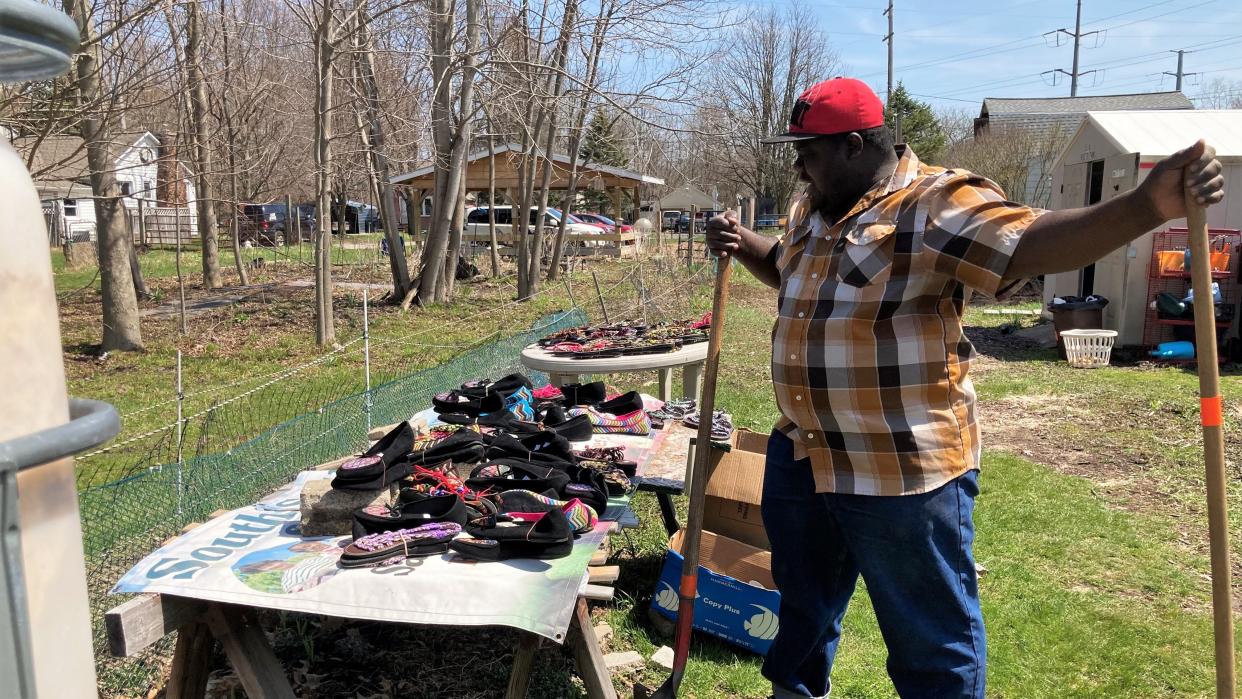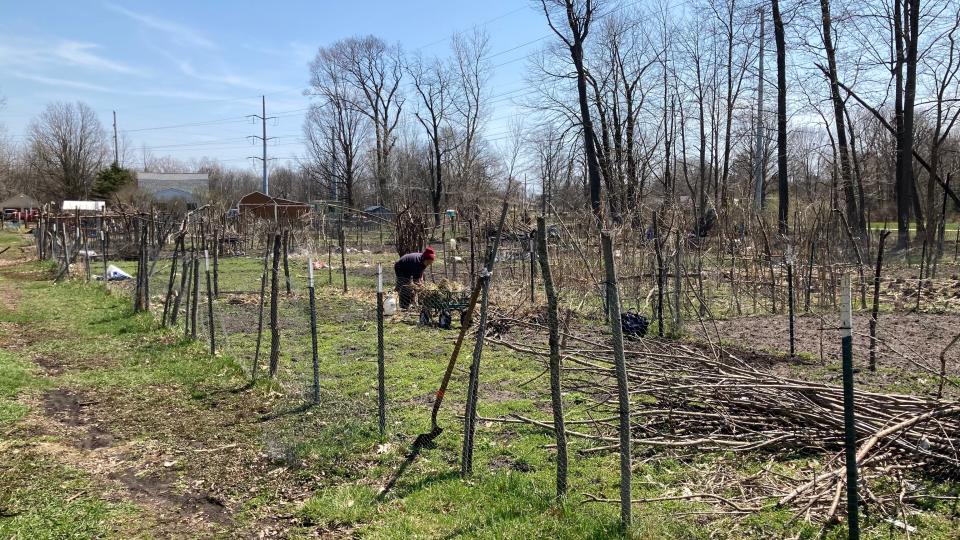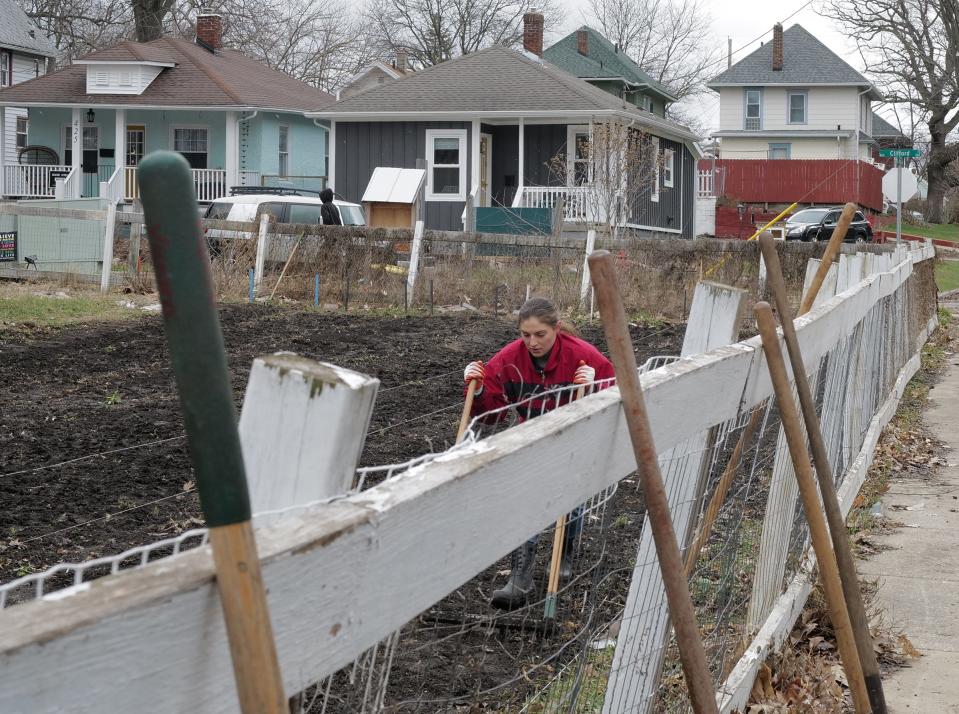Lansing urban gardens start 2022 season with goal of inclusion

When Hillary Coleman set out to join a community garden in Lansing, she bumped up against an uncomfortable reality: She was often the only Black person at the plots she visited. She searched for a time, but found mostly gardens staffed by volunteers who looked nothing like her.
"I don't think there's a lot of representation for it," she said. "People don't know where to start. When I see people doing something that's different that look like me, it makes me want to do it more."
Eventually, Coleman, who runs the natural makeup company 1991 Cosmetics and the plant exchange 1991 Greenery, took things into her own hands. She planted a garden in her west Lansing backyard and built a worm farm in her basement, where she nourishes different soil blends. She wouldn't be surprised to see more people of color start small personal gardens like her.
In the past few years, several plots have sprouted that cater to people of color, including Hunter Park Greenhouse, Tender Heart Gardens and Webster Farm Community Garden. But Coleman believes existing gardens could adapt to welcome different types of volunteers, too.
More: Lansing group is working to secure land for farmers from marginalized groups
She founded 1991 Greenery — the plant exchange — in part after noticing homogeny in local gardens. She said many Black gardeners like her may be hesitant to wade into the white-majority spaces.
"I think when we enter white spaces, we're so used to being judged, stared at and seen as different," Coleman said. "I do think that's a big cause of us not wanting to join white spaces."
Jazmin Anderson, co-owner of the online plant shop Stay Rooted, bought land in north Lansing last year from the Ingham County Land Bank to start a "giving garden" with her husband, Paul. When it opens in about a year, they'll grow food for donation throughout the community.
"We just want to be able to have this open space that people can utilize and have fresh fruits and vegetables that anybody in the community needs," she said.
More: A Black farmer wants to diversify agriculture one mushroom at a time

Gardens serve as community space for refugees in Lansing
Tamba Fayla has grown food for roughly three years at Webster Farm Community Garden in south Lansing. He said the hobby has helped him establish independence by growing his own food. It's also been good for his blood pressure, he said.
A Liberian refugee, Fayla first fled his home with his family during civil war for Sierra Leone, eventually ending up in Lansing.
The garden has helped Fayla meet other refugees like Bhim Magar, born to a Nepali family in Bhutan. Magar's family has maintained plots at the Webster garden for nearly 10 years since settling in Lansing, and sells the food it grows there at a market in Grand Rapids.
Garden manager Sue Lantz, a local community gardening advocate, bought the 10-acre plot from the land bank in 2010 for $1. About two acres of it are used for gardening.
The Webster garden has become a place where refugees find reprieve from city life. Lantz said that some refugees have experienced bullying since arriving in Lansing and are more at ease in the garden.
"We respect each other and we have none of that stuff that goes on outside here," she said.
Mary Lamson has volunteered at Webster for five years. She said most families find the south Lansing garden through word-of-mouth and gain independence as they work there.
Church gardens: A Lansing church thought its community garden was tax-exempt. Then it got a $30,000 bill.
"They want to grow foods they can't find in the regular markets," Lamson said.

Coleman also considers Allen Neighborhood Center a great incubator for gardening, as it offers a mix of programming at its Hunter Park Garden House. She recently led a class there on houseplant therapy in February.
"Just having a space where they can bring people more into that urban garden space, and having different people teach what they're good at, I think that's awesome," she said.
Capital United Land Trust also maintains a garden on Lansing's east side catering to the LGBTQ community. Team members Morgan Doherty and Ana Wolken manage the land.
Perennial gardens: New greenhouses make south Lansing community garden a year-round operation
To expand their reach, Coleman said garden leaders can change their atmosphere and actively welcome more people of color.
"Treat us like we're not different," she said. "That's a huge bit of it."
Wheelchair-accessible garden beds, gardens along CATA bus routes and other improvements would also build a more inclusive environment, Anderson said. Ultimately, if a group of people doesn't know an urban garden exists, they won't use it.
"If I don't know that this is there, don't know about these opportunities, don't know that I can rent out this plot, then I'm never gonna do it."
Support local journalism and get unlimited digital access! Subscribe for only $1 for six months!
Contact reporter Krystal Nurse at (517) 267-1344 or knurse@lsj.com. Follow her on Twitter @KrystalRNurse.
This article originally appeared on Lansing State Journal: Lansing urban gardens set goal of inclusion to start 2022 season

